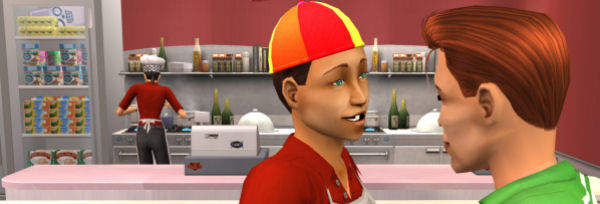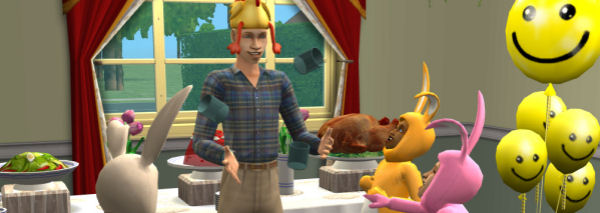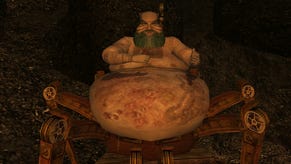Dinner With Rod Humble: Sims Style Stuff
Last week we brought you part one of our interview with EA’s Rod Humble. This week we bring you the second part, where we get down to talking about Rod’s day job: The Sims. When you’re sat down for dinner with the man in charge of one the biggest selling gaming franchise ever, and have a chance to find out more about the forthcoming The Sims 3, what do you ask about? Peeing. And then some slightly more practical questions. Along the way we discussed The Sims’ sociology on a wider scale, how Rod finds freezing to death endlessly funny, and why The Sims’ expansion packs deserve a better time than the gaming press gives them.
RPS: You said that you want Sims 3 to welcome back the hardcore.
RH: Yeah. We’re adding systems which add depth and longevity to the gameplay. In addition to being able to go up many different advancement tracks, such as gardening or hobbies. The game also gives you little tasks to do. The game has an added depth that I think we’ve learned from other games that have come out in the last four or five years. It adds that extra meat of challenge. I think a lot of current players love all the Sims games as creative tools, but quite often I think core gamers like challenge and depth, and we’re always trying to strike a balance. I hope Sims 3 adds a little bit more to that balance.
RPS: Can you name some of those games that influenced you?
RH: Well, there’s that wonderful game called EverQuest.
RPS: [Rod worked on EverQuest in the olden days] I think I’ve heard of that.
RH: Glad to see my old friends at Sony Online still doing so well. I do think that kind of gameplay, in terms of its depth and ability to really get your teeth into a long-term challenge, was very important to us. You’ve got to have a lot of respect for any game that can grab people’s attention and hold it for that long. So there’s a little bit of addition in that direction. I wouldn’t want to give the wrong impression. I wouldn’t want to say that The Sims 3 is a game all about challenge. It’s very much a Sims product, but if you want that extra depth it’s there.
RPS: How does a super-speedy daily routine work with more to do? If there’s one thing that drove me mad about The Sims, it was taking so long to do tasks that should be really quick.
RH: Sure, we’re going to tune it. I think that the core game in Sims 2 was probably a little too time-constrained. A few minutes of game time was a week. But that’s slightly extended. We want people to feel like they’ve lived the life, to get more of a sense of rhythm. That’s important when you’re in a seamless world, and an entirely simulated town as well. Yeah, we’ve extended that a little bit, so you get to enjoy life a little bit longer.
RPS: Something that’s always struck me about The Sims is how the world has this slightly Stepford Wivesy feel, this strange sanitisation. It’s a world without misery, without horror. Why is that?
RH: We’ve talked about this internally, this tone. So for instance the ideal homeless person in The Sims would be the wise, crusty old soul with fingerless gloves, huddled around one of those barrel fires. Quite the gentleman-of-the-road philosopher, rather than anything edgy. We do have this semi-idealised version of the world. It’s very deliberate, it has this tone of a certain kind of whimsy and a certain kind of safety. It also helps you look at the world a little bit differently, and that leans into our perspective of The Sims. Well, they’ve been called internally, “hamsters with jobs.” In one way you’re meant to role-play them, but in another way you’re meant to be looking at them, and have a certain amount of distance.
RPS: So do people draw this distinction?
RH: When you talk to Sims players, as we do quite a lot, quite often you’ll see they change perspective, from first-person to third-person. So if they’re describing a play session, they’ll say for example: “I went out on a date, but my Sim messed it up.” They’ll change that perspective mid-sentence without noticing. That again is deliberate – as a game it’s trying to sail close to the edge, between are you role-playing, or do you have these little creatures at arm’s length, as a separate entity putting things into this world.
RPS: It’s almost like you’re imposing benevolence upon the player.
RH: Yes, sometimes. And sometimes you can become that Sim. A lot of it again is trying to give a unique viewpoint into human life. It’s an adorable thought. What if you did have the ability to sit above people you knew and watch them go about their daily lives, and then be able to give them hints as to what to do. It’s a pretty cool thing to think about. I don’t know if it’s voyeuristic, or if it’s more like looking at little machines.
RPS: I was asking some friends of mine with five kids, who all play The Sims a lot, I said to them my thought that more bad things should happen. I know it seems morbid, but there should be more of reality. And they immediately started shouting, “But everything catches fire! We always cry when the house burns down!” So how do you find that balance between this hamster-world, and the real-life subjects like Social Services taking your baby, or your house catching fire.
RH: Well both of those examples are done in a funny way. If disaster strikes in your Sims household, it’s kind of entertaining. And even if the worst happens, one of your Sims dies in some kind of household accident, then Death shows up, and that’s funny. Death is an agent in and of himself, so players will see Death come in, claim the dead Sim, and then before Death disappears he’ll go and use the toilet. Or he’ll go to the fridge and make himself a meal. That last little twist of lightening up the situation helps add to the comedy value… I don’t know if it’s comedy. It’s a different kind of drama. They say tragedy plus distance equals comedy, and I think we try to put in emotional distance for the player. Make everything upbeat in its own way, have it’s own twist. We do have to be very careful.
RPS: You seem to like the death bits.
RH: We have a lot of fun with it, so every expansion pack we come to the point where we’re adding in some new death states. I remember in Seasons they were putting in the death state of being snowed to death. The person is in a snowstorm, and you see them trying to fight it and fight it, until the fighting slows down [laughs] and he just rolls over and gives up. It shouldn’t be funny. But oh my goodness, it is. It’s always about mean things happening in an amusing way. There’s also a lot of potty humour in it, and we fully embrace that. I think that’s a wonderful traditional mode of humour, and I still find it funny watching Sims pee themselves. I make no apologies for it. I think that’s a classic genre and endlessly entertaining. [laughs] It makes chuckle just thinking about it!
RPS: I think The Sims has really led the way for peeing in games. I keep hearing about how, like Age of Conan NPCs will drink too much and then piss up against a wall, and I think, yeah, but The Sims did that already.
RH: We were the trailblazers.
RPS: So can we look forward to increased pee capacity in Sims 3?
RH: There are definitely new potty humour states and jokes to enjoy, sure. We’re not leaving that behind.
RPS: Whenever I mention The Sims to almost anyone, from the most die-hard fan to someone who knows it vaguely, they always say that at some point they lock someone in a bathroom, take away all the doors, and watch their Sim collapse in a puddle of his own urine. Have you any idea of the psychology behind this?
RH: [laughs] First of all, what happens in The Sims stays in The Sims. We certainly wouldn’t say that everybody does that. But it’s just hilarious. This is a guilt-free pleasure. Nobody is going to get hurt. Watching people lose control of their bladder functions is just funny. I can’t say why that is. You’re British! My God, this is our culture! This is the basis of an entire culture for us. I think it’s in the genes. It’s universal though – everybody finds it hilarious. I know some people try to hang that as a negative around the game. But I embrace it – it’s a wonderful, traditional source of humour.
RPS: I think it shows a level of honesty. If you ever see a kid playing with her toys, it’s never a pure and happy game. There’s always suffering, there’s always people needing to wee. It’s a reality of how we play.
RH: You know, that’s very true. When I watch my son play over the years, that little devious element comes into it. If you’re playing with figures, they start to do mean things. Even if you’re playing with cars or trains, there’s going to be a crash. And it’s done with such vigour and delight. The child watches misery inflicted on this little world. I don’t know why that’s so appealing. Maybe play is getting out of our system things that we want to think through. What would it be like if that really horrible thing happened. I think everyone can look back at when they were a kid – well, I can certainly, maybe it makes me odd – wondering what it would be like if something horrible happened to my parents. What would happen? Often it’s a case of: would I have to do my homework any more? A kid always goes to the most naïve outcome. Would my grandparents give me lots of gifts? I do think it’s a part of how we play.
RPS: I think, as silly an example as it is, it makes the games feel more truthful.
RH: Yeah. And a lot of it isn’t planned. We have a rule of thumb internally that when we come to a decision that may be considered edgy, we always put that choice in the player’s hands. We’re a creativity tool, and we don’t have a linear story. We don’t tell you what’s going to happen, so for a person who picks up the game and never wants to see anything bad happen to their Sims, they won’t. By giving the player the creative control, and the authorial control more importantly, I think that’s very liberating for everybody. If you’re not interested, you’re not going to see it, and if you are, you’re going to be delighted by it.
RPS: So I used to work at a national radio station, as a lowly assistant producer, occasionally talking on air. And we had a rule: you always talk as if there’s only one person listening. If you ever became aware that there was an average of a million listeners, if you pictured that, your head would explode. You’ve just sold your one hundred millionth Sims unit. How do you rationalise that?
RH: I’m going to steal your example. I think that summarises the way that you should develop games, as well as talk with and engage an audience. The more you try to generalise your message, the more you end up sounding… There’s a reason politicians sound the way they do. If you hear a good politician talk – I say good in terms of a polished politician – they will very carefully avoid saying anything that could offend anyone. But in doing so, they reduce their message to something that addresses nobody. You have to be able to address an individual. You mention one hundred million sales of The Sims – I do a fair amount of talking with mainstream press, and one of the weird things that you learn is an uncomfortable and unwelcome feeling of sympathy for politicians. You come out of there thinking, “Oh, I just said something… I really hope that’s not what becomes the story.” What must it be like if you’re a politician who says a million words every month, but it’s the six that are a mistake that are going to be picked up and carried everywhere. But in terms of the creative process, absolutely. You’re free because you’re not making a hard statement – unless that’s through the game mechanics – you can just say that this is going to be the player’s choice.
RPS: It seems like the specialist press has lost a lot of patience with The Sims because of the add-on packs. When a new one comes out, it immediately looks down its nose at it. Why do you think this has happened?
RH: I would say that people who don’t like add-on packs are the kinds of people who would drink Coca-Cola in a world of Champagne. [Editor’s note: I still cannot work out what this means.] Every pack, from our perspective, we put as much effort into it as an original game. For us, and for our players, I think these are new games that add to their experience. It’s certainly incredibly hard work, and I’m very proud of the amount of innovation we put into them. In terms of people’s reactions in the core gamer press, well I hope they enjoy it. We respect their views, and just want them to know we’re really proud of the games. No matter what, we try not to be lazy, so we always try to do either something new, or if our players want something again, then something with extra value, with a twist on it. I think the words “expansion pack” probably come across as a negative themselves.
RPS: I’ve heard you say before that you created a business simulator, and people didn’t notice.
RH: Yeah, if you look at Open For Business, you can create any kind of business you want, plus have the people who run the business run their own lives, and the business simulator has incredible depth. You can make a bookstore with whatever books you want, you can make objects like toys and sell them in a store, you can design the store your own way. It was surprising to me, given just what an incredibly deep game that was – an entire business game – that it wasn’t critiqued like that. Which led me to believe that perhaps the Sims expansion packs get put on someone’s desk, “Here’s another one, check out the objects and interactions.” I really think they’re a little deeper than that. I was really proud of Open For Business, and even an expansion pack like Seasons – it’s a game about how the yearly cycle of weather impacts people’s lives. That’s a huge deal. I was really proud of that as well. I think it’s all about perspective.
RPS: The Sims is heavily focus tested, isn’t it? Why is it that focus testing in games seems so effective, while in movies it’s so destructive?
RH: I think the reason it works is because you’re not usually going to change the content in response to a focus group, but the way you play it. A lot of it is ease of use. With The Sims we always get a lot of, “If only I could do X.” “But you can! Can’t you see it buried under twelve menus?! What’s wrong with you?” So we change it. There’s never been a mandate from EA saying, “Focus group players didn’t like this, therefore you need to change it.” We just get a report for the developers, who want to make it good.
RPS: So I suppose the equivalent would be a cinema focus group who responded that they couldn’t see the screen clearly.
RH: Exactly. Maybe that’s why it works for games. It would be frightening if we were changing the content. I wouldn’t like that.
RPS: Do you want to be working on Sims 4?
RH: I’m really happy, so sure. There are a lot of great creative leaders within the Sims label. It’s not like I have to worry about everything.
RPS: Okay, so I understand that this question is loaded, but…
RH: I’ll unload it.
RPS: Will Wright could have gone on to keep making The Sims, but he had another idea in mind. Do you have that burning project you want to go on to?
RH: It’s really interesting. I kind of get that already. I think the difference is I really enjoy working on multiple things at once. Sure, we’re working on The Sims 3, but at the same time we’re working on MySims, the Sim City franchise, Sims Carnival, all of the add-on packs – Castaway this year was really fun – so it’s not like I feel I’m stuck anywhere. I think people expect us to do quirky stuff. I think it’s assumed that we’re going to be doing weird stuff – if there’s one thing I really admire about the old 1990s Maxis, if you look at their stuff, some of it was really weird. I think I get it right now. I don’t know. In a year’s time I could tell you I’m ready to kill myself, but right now I’m happy.
















